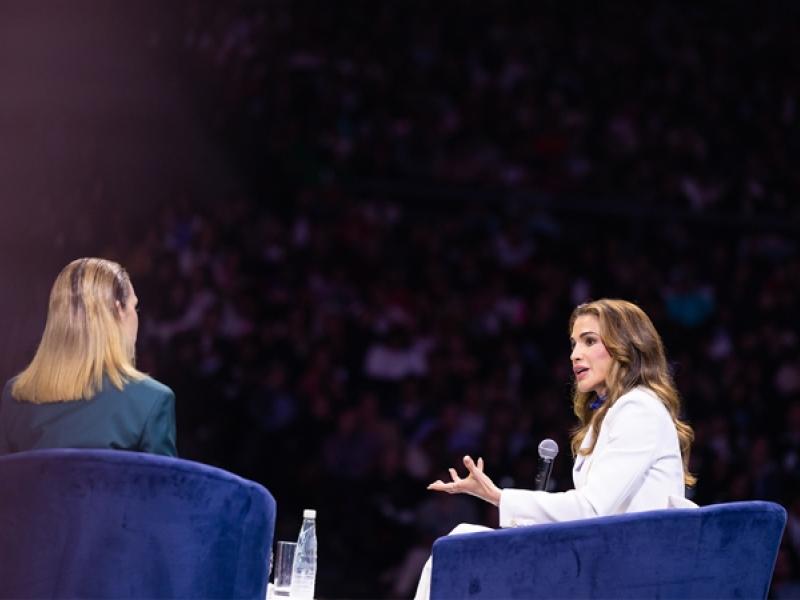MICHELE NORRIS, host:
King Abdullah of Jordan had a friendly warning for President Obama when the two met at the White House yesterday: Time is running out for a two-state solution for the Israeli-Palestinian conflict. The king’s wife, Queen Rania Al Abdullah, is also in Washington and in her own way, she’s reinforcing that message. Queen Rania is Palestinian. She’s 38, glamorous, college-educated and what you might call a thoroughly modern monarch. She uses her popularity throughout the world to shed light on a range of issues, from Middle East peace to access to education for women. Last year, she launched her own YouTube channel to take on Muslim stereotypes. In a send-up of David Letterman’s Top Ten List, the queen explains why.
(Soundbite of Queen Rania’s YouTube channel)
Queen RANIA AL ABDULLAH (Jordan): Number 10: Because I didn’t have enough friends on Facebook. Number nine: Because anything Queen Elizabeth can do, I can do better. Number eight: Because I was tired of people thinking Jordan was just a basketball player.
NORRIS: And the number one reason?
(Soundbite of Queen Rania’s YouTube channel)
Queen RANIA: Because suspicion, intolerance and mistrust are driving us apart.
NORRIS: Earlier today, I sat down to talk with Queen Rania. On the Mid-East crisis, she says she worries about cynicism after so many failed attempts at peace.
Queen RANIA: Cynicism is one of the greatest enemies that we face in this process because, you know, when you get cynical and you say, well there’s never going to be a solution for this problem, then in effect, what you’re doing is writing off the futures of hundreds and thousands – not millions – of people. condemning their lives to hardship and really saying that there’s no future for them. So, we cannot afford to be cynical. We know what the solution is to this problem. What we need is the political will and the commitment from all parties to really take the steps that need to be taken on the ground. And, you know, we mustn’t let the extremists on both sides dictate the agenda and the path towards this process because, unfortunately, that’s what gets done.
NORRIS: Your husband, King Abdullah, spoke with our diplomatic correspondent, Michelle Kelemen, and he said that Israel has to make a decision. They have to decide if they want to be part of the neighborhood, or if they want to continue to be, as he called it, fortress Israel. What are you hoping from this new administration in its dealings with Israel? What do you want to see?
Queen RANIA: Well, Michele, ultimately peace for Israel is going to come from being accepted regionally. And it’s not going to come from building walls or barriers, or from conflict or from war, and from isolation. That’s not the kind of life that Israelis want or deserve. And what my husband is referring to is the Arab Peace Initiative, which was endorsed by 22 Arab states, endorsing the two-state solution, offering acceptance for the Israelis in the neighbor hood, and for Palestinians to have sovereignty on their own the land. And it’s very important for us to pursue that. And absolutely, what we want from the administration is to really hold both sides accountable, to really say, you know, this is what needs to be done: You may need to make your commitments and to really honor those commitments on the ground, that people can feel in their day-to-day lives.
NORRIS: How do you make sure that people have the stomach for that, though? Because the extremists will push back. They will try to derail the process.
Queen RANIA: Our humanity is what gives us the stomach, because everybody wants to have an opportunity to have a normal life. Now the new president enjoys an incredible amount of credibility all over the world, as you know, and particularly in our region. And we hope that he has this – that his administration’s able to articulate and map out a vision for our region, and to be able to expand his political capital in the right way and to invest it in really trying to find a final solution to this long-standing issue.
NORRIS: Your majesty, you have spent a lot of time trying to fight damaging Muslim stereotypes. You have your own channel on YouTube, and you’ve essentially said send me your stereotypes and I’ll deal with them one by one. You seem to be saying bring it on, and I’ll deal with whatever you through my way. Were you surprised, though, by what you heard and what you saw?
Queen RANIA: You know, going into this, I knew that I was exposing myself. But at the end of the day, that was the idea because you’re a public personality, no matter how much you try to remain open, invariably, there will filters around you and you may not hear it as it is. So YouTube was an incredible platform for me to be able to interact and to hear the points of view unedited, unfiltered, you know, to just see - to get the real information. Now, I knew that I would be, you know, exposing myself and, you know, being bombarded with views from all over. And some of the responses were surprising. There were a lot of negative ones. There were a lot of positive ones.
But at the end of the day, the idea was to create the debate. And people did talk. They did bring out a lot of issues. There was a lot of discussion, and there were a lot of friendships forged. And a lot of these stereotypes were exposed. And it’s not until you really interact with the side, where you try to see things from their eyes that you start to empathize and understand. And that’s where you get more of the tolerance and acceptance among people of different cultures. And ultimately, in this globalized world, that’s what we need to achieve. These are the moments that are most rewarding in one’s life, is when you actually venture out of your comfort zone.
NORRIS: You know, I wonder if you ventured out of your comfort zone in doing this, because you were very funny. You seemed to remove the filters even for yourself – the top 10 list that you went through, the David Letterman-type list that you went through, explaining why you were doing this.
Queen RANIA: You know, I think generally, in life, I try to always ensure that there are periodic moments where I do venture out of my comfort zone, because that’s what keeps you alive. That’s what keeps you from getting stale. And, yes, YouTube was definitely a venture out of the norm for me and for anyone in my position, actually. And it was – has been an incredible learning experience for me.
NORRIS: Did you write those top 10 reasons yourself?
Queen RANIA: I had a hand in it, but I did it with my team at the office.
(Soundbite of laughter)
NORRIS: They were very funny.
Queen RANIA: Thank you. Thank you.
NORRIS: Your majesty, Queen Rania, thank you so much for spending time with us.
Queen RANIA: Thank you, Michele. It was an absolute pleasure.
NORRIS: That was Queen Rania al-Abdullah of Jordan, and you can watch her YouTube top 10 at our Web site: npr.org.
ROBERT SIEGEL, host:
Also, we’ve been asking many of the newsmakers we meet about the music they’re listening to, the movies they’re watching or the books they’re reading. It’s a little project we call The Question, and we’ve collected the answers online. To hear what’s on Queen Rania’s iPod, you can go to our Web site: npr.org.
Copyright ©2009 National Public Radio®



